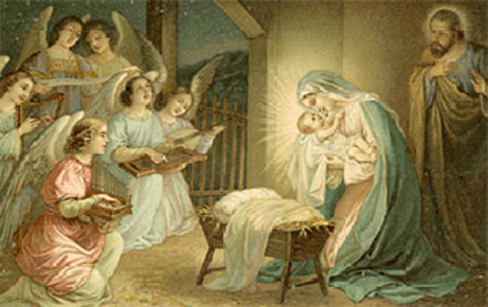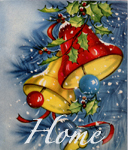NOEL NOUVELET

(15th Century French Traditional )
1. Noel nouvelet, sing we a new Noel;
Thank we now our God, and of His goodness tell;
Sing we Noel to greet the new born King;
Noel nouvelet, a new Noel we sing!
2. Waking from my sleep, a vision came to me;
For before my eyes there stood a flow'ring tree,
Where on a bright red rosebud I did see.
Noel nouvelet, a new Noel sing we!
3. How my heart did glow, with inward joy divine!
For with rays of glory did the rosebud shine,
As when the sun doth blaze on break of day.
This new Noel sing we: Noel nouvelet!
4. Then a tiny bird ceased joyous song to say
Unto certain shepherds: "Haste you now away!
In Bethlehem the newborn Lamb you'll see."
Noel nouvelet, a new Noel sing we!
5. Mary and Joseph in Bethl'hem they found,
Where the Infant lay, with ox and ass around,
And for a crib, their manger full of hay.
This new Noel sing we: Noel nouvelet!
6. So, upon my bed, I saw these wonders all,
Dreaming of a Child, an Infant Child so small:
Jesus of Naz'reth, called a King to be.
Noel nouvelet, a new Noel sing we!

Christmas in French Canada
On the Habitant country of the old Province de Quebec, echoes are given back to us of the ancient French Fete de Noel with its quaintness. characteristic lightness of spirit and intense religious feeling. It presents itself on Christmas Eve with all the mellow charm of an illuminated medieval manuscript and bears all its rich color and simple declaration of Faith, whether it be in the glory of the Cathedral, Basilica or naive setting of the country "Eglise."
Christmas Day commences with a Midnight Mass of great splendor: this is followed by the Reveillon, an after-church supper in the home. The table is brightly set and carries a full array of native dishes, hams, turkeys, nuts, sweets and fruits, with the ubiquitous wine and liqueurs. No exchange of gifts takes place at this time, this being reserved for New Year's Day, when parties and festivities are at their highest. The holiday season is brought to a close with the Feast of the Kings on Epiphany, January 6th.

(15th Century French Traditional )
1. Noel nouvelet, sing we a new Noel;
Thank we now our God, and of His goodness tell;
Sing we Noel to greet the new born King;
Noel nouvelet, a new Noel we sing!
2. Waking from my sleep, a vision came to me;
For before my eyes there stood a flow'ring tree,
Where on a bright red rosebud I did see.
Noel nouvelet, a new Noel sing we!
3. How my heart did glow, with inward joy divine!
For with rays of glory did the rosebud shine,
As when the sun doth blaze on break of day.
This new Noel sing we: Noel nouvelet!
4. Then a tiny bird ceased joyous song to say
Unto certain shepherds: "Haste you now away!
In Bethlehem the newborn Lamb you'll see."
Noel nouvelet, a new Noel sing we!
5. Mary and Joseph in Bethl'hem they found,
Where the Infant lay, with ox and ass around,
And for a crib, their manger full of hay.
This new Noel sing we: Noel nouvelet!
6. So, upon my bed, I saw these wonders all,
Dreaming of a Child, an Infant Child so small:
Jesus of Naz'reth, called a King to be.
Noel nouvelet, a new Noel sing we!

Christmas in French Canada
On the Habitant country of the old Province de Quebec, echoes are given back to us of the ancient French Fete de Noel with its quaintness. characteristic lightness of spirit and intense religious feeling. It presents itself on Christmas Eve with all the mellow charm of an illuminated medieval manuscript and bears all its rich color and simple declaration of Faith, whether it be in the glory of the Cathedral, Basilica or naive setting of the country "Eglise."
Christmas Day commences with a Midnight Mass of great splendor: this is followed by the Reveillon, an after-church supper in the home. The table is brightly set and carries a full array of native dishes, hams, turkeys, nuts, sweets and fruits, with the ubiquitous wine and liqueurs. No exchange of gifts takes place at this time, this being reserved for New Year's Day, when parties and festivities are at their highest. The holiday season is brought to a close with the Feast of the Kings on Epiphany, January 6th.
http://catholicharboroffaithandmorals.com/
